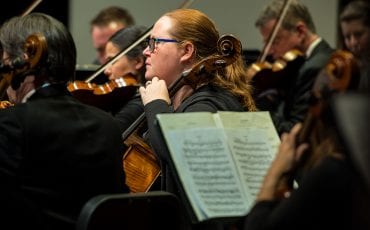Beyond the Label
We are very brand conscious. What labels should we pay attention to? Is the name brand of cereal that much better than the store brand? The trends of carrying a Bogg bag to the neighborhood pool, wearing Lululemon leggings to Target, or being sure you have the latest and greatest smartphone are around us day in and day out. We buy these things because we want to fit in or feel like we do.
We’ve all fallen into the trap once or twice, but when it comes to using labels to pre-judge people – especially children – it can be a slippery slope. It is also very isolating and difficult for the parents raising these kids whose challenges are invisible to the naked eye.
So, what do parents of these children with special needs want you to know? In short, that a diagnosis does not define a child.
Table of Contents
Rhett Bostedo, 6, Brookhaven
Diagnosis: Disfluency (Stuttering)
Mom Katie noticed that, as a preschooler, Rhett stuttered. She asked the pediatrician who responded that he’d grow out of it – his mouth can’t keep up with his brain – they said. “It was a pretty significant stutter, but we gave it some time,” she said. When Rhett started PreK, the stutter was still there.
“That’s when we were referred to speech therapy,” said Bostedo. Rhett was 5 years old when they began the very parent-driven process. “We’d have ‘smooth talk time’ every day. This involved us playing games designed to help him concentrate on talking without stuttering. He caught on quickly and would stop stuttering during that time, but other times during the day, he would still stutter.”
Not knowing the cause of the stuttering or really how to help him was stressful for Bostedo. “I didn’t want him to be made fun of,” she said. After three months of speech therapy, Bostedo realized it was hurting her mother-son relationship with Rhett. “He would say to me, ‘Mommy, I don’t have to be perfect all the time.’ But, other therapy is very hard to get covered by insurance as it’s not considered medically necessary.”
After doing some research, Bostedo came across the Arthur Blank Center for Stuttering and Research. “I called them and started with the spring semester in February of 2022. Rhett has transformed,” she said. “His confidence has gone through the roof. His teacher has noticed he raises his hand in class now and isn’t afraid to speak in front of his peers.”
Bostedo said that what she has learned has also been life changing as a parent. “I attended Zoom sessions that helped me understand how to communicate with Rhett about his stuttering. Before we were told never to use the word stuttering or address it, but now I have tools to help him communicate and know that it’s OK if he stutters.”
Anxiety doesn’t cause stuttering but when kids are stressed, it can make the stuttering worse. Being open about things is key when your child has disfluency. Ignoring it doesn’t make it go away and not discussing it can make a child feel insecure when they speak. “If we just talk to them about it, they will feel comfortable,” said Bostedo. “Say, ‘Hey – did you hear that? You stuttered…it’s a normal thing that happens, but can you think about what you want to say? What you say is important to me and I’ll wait as long as it takes for you to say it.’”
Bostedo said she’s learned to listen to her gut and advocate for Rhett through this experience. She wants Rhett to always know that his voice matters. “He’s the most empathetic person I’ve ever met,” she said. “He thinks about others before himself. If he sees there’s only one cinnamon roll left, he’ll said ‘I should share it with my sister,’ even if he hasn’t had one yet.”
Harrison Matthes, 10, Roswell
Diagnoses: Autism and ADHD
Diagnosed just before his 4th birthday, it did not come as a surprise to mom Stephanie. She has since sprung into action has Harrison’s No. 1 advocate fueled by passion and love. Autism is a spectrum, so each child is truly unique with their own strengths and challenges. Some people with autism are non-verbal while others, like Harrison are high functioning.
“Kids with autism are different, not less,” said Matthes. “I can only tell you about life with Harrison.”
Harrison is an energetic and hilarious boy who loves talking about his obsession with Minecraft, Transformers and LEGOs. Many people with autism tend to have specific areas of interest in which they are incredibly knowledgeable. “Harrison is able to create Transformers out of random LEGOs which also have the ability to transform,” said Matthes. “He dreams of visiting Egypt one day to explore the pyramids. He also has an incredible memory of specific experiences from his past and knowing the dates they happened.”
While his interests keep him busy, team sports, which are very popular for boys his age, are not something he wants to take part in and can make him feel lonely. “We struggle to find other organized activities that interest him,” shared Matthes. “Nearly two-thirds of children with autism between the ages of 6 and 15 have been bullied for being different. I advocate for awareness and acceptance because Harrison and other kids with autism have feelings just like anyone and should be treated with respect, understanding and acceptance.”
Harrison is in a public, general education classroom with support. As with many other conditions, early intervention is key for children with autism. Therapies can help with communication and social skills, as well as address co-morbid challenges like ADD/ADHD and Sensory Processing Disorders, which are extremely common for people with autism. His Individual Education Program (IEP) helps him receive special accommodations and services like Speech and Occupational Therapies. “Every special needs student who meets eligibility should have an IEP,” said Matthes. “Since I’m not an educator, I hire a special needs advocate to attend meetings along with me to ensure I’m getting my son the best public education possible and understand all of my options and rights.”
There are a myriad of autism organizations, as well as social media and parent support groups on the local, state, national, and global level that can provide guidance to those navigating life after their child’s diagnosis. “You are not alone in navigating autism. No parent ever wants a harder life for their child. It’s OK to grieve the life you envisioned,” said Matthes. “To see your child frustrated and struggling with a task that another child easily accomplishes is extremely difficult and unfair.”
People are familiar with autism, so advocacy has morphed from awareness to acceptance and understanding. Even adults can sometimes be unaware of how to react or what to say. “If I say my son has autism, please don’t say you are sorry. Don’t say someone doesn’t look or act autistic. Don’t say, ‘he seems so normal,’” said Matthes. “Instead, ask what you can do to be more inclusive, or how to learn about autism. People with autism are aware of more than what they communicate. They may be different, but they are not ‘less,’ so please try not to judge and instead educate yourself and teach your children understanding and acceptance.”
Amari Jones, 15, Roswell
Diagnosis: ADHD
Being part of the professional community at Mill Springs Academy, mom Taniah was very familiar with the signs and symptoms of ADD and ADHD, so when her daughter was having a hard time concentrating on homework, she suspected that something might be going on. At the same time, her daughter’s third grade teacher brought up concerns about Amari being easily distracted at school and having challenges with reading comprehension.
Jones realized the next step was to get a full psych eval for Amari to understand her needs. The test results came back with an ADHD diagnosis, and soon after an IEP was implemented for Amari. Even with the diagnosis, Jones knew it was important to treat her daughter like any “typical” child. “Sometimes, there are issues with impulse control,” said Jones. “I always try to use it as a teachable moment. I ask, ‘What was the impact of your actions?’ Why did you make this choice?’ Helping her, and other children with ADHD, understand what the driver of the behavior is helps.”
The most important thing Jones has instilled in her daughter over the years is that just because she learns differently, it doesn’t make her any less as a student or person. “I always tell her, ADHD won’t stop you from accomplishing your goals. She sometimes felt she wasn’t smart enough to go to college, but now that she has the right tools and medications, she sees a bright future for herself,” she said.
Amari excels in math and science and is a star of her volleyball team. “She can come off being shy, but is really a fun young lady,” said Jones. “She is very genuine with a big heart and wants to do what’s best for her and her community. Amari is a God-fearing young lady and is great with kids.”
Jones also notes that having a strong community around Amari has been important. “As they say, it takes a village,” she said. Among Amari’s village are her teachers, friends, teammates and therapist. “Having someone to talk to in a safe space with time to self-reflect has really helped Amari, especially in times when she’s feeling frustrated.”
Next time you encounter a friend, neighbor or co-worker who shares news of a diagnosis or an update on their child with special needs, show kindness and empathy. Ask how you can be supportive. And look beyond the label to appreciate each child for who they are.
-Tali Benjamin










